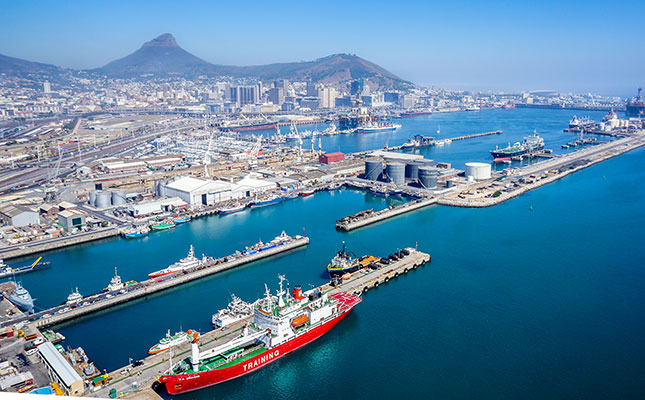
Photo: SkyPixels/Wikimedia Commons
Stakeholders in the fruit and wine industries are doing everything in their power to address logistical challenges and bottlenecks at South Africa’s ports, specifically the Port of Cape Town, with the situation currently being exacerbated by the Russia-Ukraine conflict.
Jacques du Preez, Hortgro’s general manager for trade and markets, said the situation at the Port of Cape Town had not improved much after the difficulties encountered between December 2021 and February this year, and he expected the situation to remain difficult for the next 12 to 24 months.
Rina Hertog, country manager for South Africa at international shipping company Hillebrand, told delegates at a recent Vinpro workshop that the Port of Cape Town had lost 96 operating days during the 2021/22 financial year.
This had resulted in a backlog of more than 1 000 trucks awaiting processing of their loads, putting pressure on workers during cargo-loading onto ships.
The long turn-around times also resulted in many cargo vessels bypassing Cape Town altogether.
Hertog said she did not expect the situation to improve soon: “A lack of space and containers globally, disruptions due to [geopolitical] and civil instability, and high ocean freight rates will remain in 2022, with the next few months [expected to be] very volatile.
“On top of this, 50% of the global [shipping] fleet does not comply with the International Maritime Organization’s carbon emission objectives, which take effect in January 2023. This could result in many vessels dry-docking [to undergo] technical changes, and a reduction in speed for those that cannot comply.”
Du Preez said that due to fruit quality being compromised as a result of these logistical challenges, a conservative estimate was that the deciduous fruit industry was losing about 10% of the financial value of all fruit.
This amounted to about R1,6 billion for the apple and pears industries, but did not include additional costs such as sharp increases in logistical and transport expenses, including transporting fruit to the Durban and Gqeberha ports to be shipped from there.
It was difficult to quantify the impact on the wine industry, but Christo Conradie, Vinpro’s manager of wine business, said it affected exporters’ cash flow, resulted in quality losses, as well as shortages of products that had to be imported, such as bottle closures, barrels and packaging material.
Both industries were actively engaging various government role players, on a national as well as provincial level, to address infrastructure, equipment and productivity efficiencies.
Vinpro representatives were also engaging with shipping company Maersk and would shortly be meeting with Rajesh Dana, manager of the Port of Cape Town, to address infrastructure and logistical flow at the port.
“By improving the flow, we will at least be able to persuade shipping lines not to bypass the Port of Cape Town,” Conradie said.
Hortgro, together with Agbiz, the South African Table Grape Industry (SATI), and the Fresh Produce Exporters’ Forum (FPEF) have also contracted strategist Angelo Peterson to represent them in high-level strategic engagements with senior Transnet officials, aimed at establishing a public-private partnership by the end of June.
According to Hortgro, the aim would be to separate the role of “landlord” and port operator, and path the way for the privatisation of the harbour.
Du Preez said equipment procurement and maintenance was the main focus over the short to medium terms, as well as the legislation governing the relationship, responsibilities and accountability between the landlord and operator and other logistical service providers.











